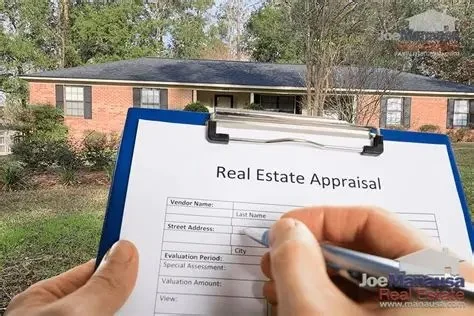
- 1. Introduction
- 2. What is a Home Appraisal?
- 3. Why Are Home Appraisals Needed?
- 4. How Appraisals Impact the Buying and Selling Process
- 5. Steps Involved in a Home Appraisal
- 6. Common Issues That Arise in Appraisals
- 7. Conclusion
1. Introduction
When buying or selling a property, understanding the role of home appraisals is essential. A home appraisal is an unbiased professional opinion about the value of a property, which plays a crucial role in real estate transactions. In this article, we will explore the significance of appraisals, how they influence both buyers and sellers, and the steps involved in the appraisal process.

90W Luxury Apartments / 90w nyc
New YorkNew York CountyNew York
90 Washington St, New York, NY 10006, USA
2. What is a Home Appraisal?
A home appraisal is a professional evaluation of a property's market value, conducted by a licensed appraiser. The appraisal is typically ordered by the lender as part of the home financing process. It serves as an independent assessment that ensures the property’s sale price aligns with its true value. Home appraisers take into consideration various factors, including the property’s size, location, condition, and comparable sales in the area, to determine its value.

Avalon Brooklyn Bay / avalon brooklyn bay
1501 Voorhies Ave, Brooklyn, NY 11235, USA
3. Why Are Home Appraisals Needed?
Home appraisals are essential in both the buying and selling processes for several reasons:
- For Buyers: Appraisals protect the buyer by ensuring they do not overpay for a property. If the appraisal comes in lower than the purchase price, the buyer may need to renegotiate or provide additional funds.
- For Sellers: Sellers can use appraisals to help set a competitive price for their home. Knowing the market value ensures they do not undervalue their property, potentially losing money in the sale.
- For Lenders: Lenders use appraisals to determine the amount of money they are willing to lend. If the home’s value is lower than the purchase price, the lender may not approve the loan or may reduce the loan amount.
4. How Appraisals Impact the Buying and Selling Process
Appraisals can significantly impact both buyers and sellers during real estate transactions:
- Buying Process: If an appraisal comes in lower than expected, the buyer may need to renegotiate with the seller or come up with additional funds to meet the down payment and closing costs. If the appraisal value is higher, it can be beneficial, as it might indicate that the buyer is getting good value for their money.
- Selling Process: For sellers, appraisals help in setting the right asking price. If an appraisal comes in lower than the agreed-upon sale price, the seller may need to lower the price or risk losing the sale. Sellers can also use a higher-than-expected appraisal to justify their asking price during negotiations.
5. Steps Involved in a Home Appraisal
The home appraisal process involves several key steps:
- Scheduling the Appraisal: The buyer typically orders the appraisal through the lender, and the appraiser is scheduled to visit the property.
- Property Inspection: The appraiser inspects the home’s exterior and interior, evaluating its size, condition, features, and overall appeal. They also check for any structural issues or improvements made.
- Comparative Market Analysis (CMA): The appraiser compares the property to similar homes (comps) that have recently sold in the same area. These comps help determine the property's value relative to others in the market.
- Report Generation: The appraiser generates a report detailing their findings, including an estimate of the property’s market value. This report is then submitted to the lender.
6. Common Issues That Arise in Appraisals
While appraisals are a critical part of the home buying and selling process, certain issues can arise that complicate the transaction:
- Low Appraisals: If the appraised value is lower than the sale price, it can cause delays or cancellations of the deal, especially if the buyer cannot cover the gap.
- Discrepancies in Comparables: Appraisers may face challenges in finding truly comparable properties, which can lead to discrepancies in valuation.
- Disagreements with the Appraisal: In some cases, buyers or sellers may disagree with the appraisal. If this happens, the appraisal can be contested and a second opinion requested.
7. Conclusion
Home appraisals play a vital role in both the buying and selling process. They ensure that buyers are paying a fair price for a property and that sellers receive appropriate compensation for their home. Understanding the role of appraisals can help buyers and sellers navigate the real estate market more confidently and make more informed decisions. Whether you're buying or selling, working with experienced professionals and understanding the appraisal process can save you time, money, and stress.







 Regus0.0 (0 reviews)
Regus0.0 (0 reviews) Artemisia Management LLC3.0 (17 reviews)
Artemisia Management LLC3.0 (17 reviews) New Island Realty Inc.3.0 (8 reviews)
New Island Realty Inc.3.0 (8 reviews) Medow Property Group Ltd0.0 (0 reviews)
Medow Property Group Ltd0.0 (0 reviews) Carnegie House (enter on 6th Ave)4.0 (8 reviews)
Carnegie House (enter on 6th Ave)4.0 (8 reviews) venegas&latinos associates0.0 (0 reviews)
venegas&latinos associates0.0 (0 reviews) How to Research Neighborhood Trends Before Buying – Smart Homebuyer Insights | Luxen House Realty Hub
How to Research Neighborhood Trends Before Buying – Smart Homebuyer Insights | Luxen House Realty Hub Tips for Boosting Your Home’s Curb Appeal Before Listing | Luxen House Realty Hub
Tips for Boosting Your Home’s Curb Appeal Before Listing | Luxen House Realty Hub Tips for Buying a Home in a Historic District: What You Need to Know
Tips for Buying a Home in a Historic District: What You Need to Know Understanding the Pros and Cons of Short-Term Rentals
Understanding the Pros and Cons of Short-Term Rentals Understanding the Risks and Rewards of Foreclosed Property | Luxen House Realty Hub
Understanding the Risks and Rewards of Foreclosed Property | Luxen House Realty Hub How to Sell a Home Quickly During Peak Season - Tips and Strategies
How to Sell a Home Quickly During Peak Season - Tips and Strategies